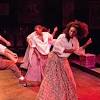What college has the best performing arts program?
The World’s 25 Best Drama Schools, Ranked
- Juilliard (New York)
- Yale (New Haven, CT)
- NYU – Tisch (New York)
- University of North Carolina School of the Arts (Winston-Salem, North Carolina)
- UC San Diego (San Diego)
- London Academy of Music & Dramatic Art (London)
- Carnegie Mellon (Pittsburgh)
- Guildhall (London)
What school do most actors go to? Producing nearly double as many professionals in the entertainment industry as any other school, New York University takes the top spot.
What college should I go to if I want to be on Broadway? Syracuse is among the top schools in the country to produce the largest number of actors that have become Broadway employed, only behind, to my sources, Elon, Boston Conservatory, University of Michigan, Carnegie Mellon, NYU Tisch, and the Cincinnati College-Conservatory of Music.
What is the hardest acting school to get into? The Juilliard School (New York, NY)
Offering degree programs in drama, music, and dance, Juilliard is highly selective in its admission process, including an in-person audition for all students.
What college has the best performing arts program? – Additional Questions
How can I audition for Netflix?
Netflix hires many production companies and each has a slightly different casting process, which means there is no one specific way to get audition opportunities. Netflix uses casting websites, agent submissions, social media, and even in-person meetings.
Where do famous actors study acting?
Many actors had formal acting training from either schools, such as the Royal Academy of Dramatic Art, Yale University, HB Studio, The Pasadena Playhouse, and The American Academy of Dramatic Arts, or from teachers such as Lee Strasberg, Stella Adler, and Michael Chekhov.
Do most famous actors go to acting school?
Not all great actors went to acting school. Charlize Theron wanted to be a ballet dancer, and got a movie role when she was noticed arguing with a bank teller. Joaquin Phoenix ended up in Tinseltown after performing on the street to support his family.
How hard is it to become an actor?
Becoming a professional actor can be incredibly hard, actors have to deal with a lot of rejection. But that doesn’t mean it’s impossible. If an actor is hardworking, dedicated to learning and persistent enough; it is definitely possible to become a professional actor.
Are acting schools worth it?
Acting classes can undoubtedly give you the necessary nudge to help you put your foot in the industry while also improving your skills. But, is it worth it to join an acting class? Yes, acting classes are absolutely worth their price as they introduce you to an important element of making it as an actor – feedback.
What are the two main schools of acting?
The four major types of acting techniques include Classical Acting, Stanislavski’s Method, Method Acting, and Meisner Technique.
What are the 4 types of actors?
There are four key types of actors, which are defined as Personality Actors, who use their own personality to bring life to a character; Creative Actors, or actors who go against their own personality; Chameleon Actors, who can play a wide variety of unrelated roles; and Nonprofessional Actors who add realism to
What are the 5 key acting skills?
If you or your child is considering getting into the craft, here are some common acting techniques you’ll learn.
- Stanislavski Method. Konstantin Stanislavski developed this systematic training technique.
- Method Acting Technique.
- Meisner Technique.
- Chekhov Technique.
- Practical Aesthetics Acting Technique.
What skills do actors need?
Here are some of the most important skills actors need:
- Communication skills. Vocal ability is just one aspect of your overall performance as an actor.
- Creativity.
- Memorisation work.
- Physical performance.
- Theoretical knowledge.
- Teamwork.
- Take acting classes.
- Join a theatre group.
How do actors memorize lines?
We’ve compiled some tips to help you quickly memorize your lines.
- Write your lines out. Try writing your lines out by hand — do not type them.
- Run lines with someone.
- Quiz yourself.
- Go for a walk or take a nap.
- Use a mnemonic device.
- Learn the cue lines.
How do I know acting is for me?
Reasons You Should Be an Actor
- You want to act all of the time. You wake up in the morning and all you think about all day every day is acting.
- You want to connect with other characters.
- You feel you could be a messenger.
- Audiences want to watch you.
- It’s fun to do it!
- You keep learning about who you are on a deeper level.
Is acting a talent or a skill?
Acting is a skill. Like most skills it’s aided by natural talent, but that’s not enough. So how do you develop your acting skills and become the confident, captivating actor that you dream of?
Are good actors born or made?
The truly great actors are indeed born. But, and this is important, they will not realize their true potential unless they train. They must be taught to harness the natural instincts with which they are born so that they can create the role and inhabit the imaginary world the writer has placed them in.
Is acting a good career?
The acting industry can be a profitable one. For every acting job, actors are paid to show up on set and act their hearts out! And acting jobs can be found all over the world in huge cities like London and New York City. Acting is a wonderful career that allows you to learn new skills and meet new people.
Can everyone be an actor?
Anyone can train to be an actor, anyone can learn the skills required. Personally, I think if acting ISN’T the capacity to BELIEVE in the imaginary and act upon your capacity for delusion, then yes, it’s possible that anyone can be an actor. However, of course, it’s not as simple as that.
Is acting harder than singing?
Acting is a lot different than singing. It’s not as theatrical, it’s a lot more subtle, and that’s a lot harder. Simpler is usually harder.
Where should a beginner actor start?
Consider these options.
- Take acting classes.
- Enroll in a formal acting program.
- Join a local theater group.
- Research and practice acting techniques.
- Watch performances and take what resonates.
- Consider taking on special skills.
- Learn how to audition.

